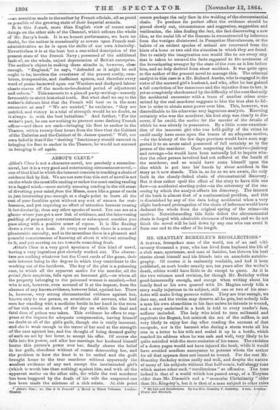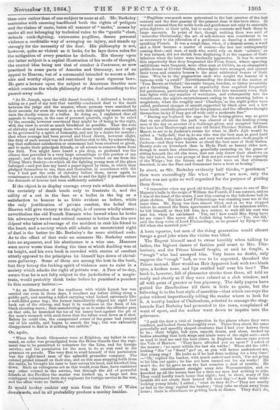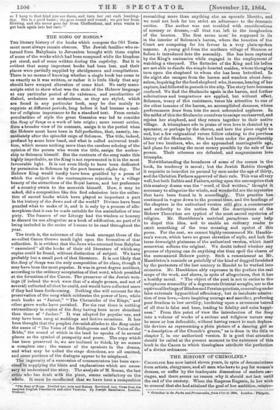MR. GRANTLEY BERKELEY'S RECOLLECTIONS.*
A CLEVER, freespokeu man of the world, son of an earl with seventy thousand a year, who has lived from boyhood the life of a club man, sportsman, and man of fashion, has thrown his best stories about himself and his friends into an anecdotic autobio- graphy. Of course it is eminently readable, and had it been published, as such books usually are, ten years after the writer's death, critics would have little to do except to quote. As it is the two volumes need revision, for though Mr. Berkeley writes good-humouredly enough, and except when writing about his family feud or his own quarrel with Dr. Maginn rarely tells a story really injurious to its subject, still one or two of his anec- dotes will make living persons writhe. They are true enough, we dare say, and the victim may deserve all he gets, but nobody tells a man his own absurdities to his face unless he intends to wound, and a story enshrined in a book is told to every reader's face, sufferer included. The lady who tried to turn milkmaid and captivate the Regent, but mistook the sex of the milkee, is not very likely to enjoy her day after reading the account of that escapade, nor is the baronet who during a storm wrote all his sins in a letter to his wife and sealed it up in a bottle, which reached its address when he was safe and well, very likely to be quite satisfied with the mere omission of his name. The excision of a dozen pages would not have injured the book, while it would have avoided needless annoyance to persons whom the author for all that appears does not intend to wound. For the rest Mr. Grantley Berkeley writes easily and well, and despite the nature of many of his subjects without that half-comic, half-slangy tone which makes other such " recollections " so offensive. The tone indeed is that of a world which has passed away, of a Toryism older than Mr. Disraeli's and a " muscular Christianity " older than Mr. Kingsley's, but it is that of a man subject to other rules
• ity Lift and Recollections. By the Hon. Brantley F. Berkeley. 2 vols. lx) idea: Hurst and Blackett.
than ours rather than of one subject to none at all. Mr. Berkeley maintains with amusing hardihood both the rights of pedigree and the claims of caste, hates all manner of "snobs," means by snobs all not belonging by technical rules to the "gentle" class, defends cock-fighting, extenuates pugilism, deems personal violence a creditable way of avenging an injury, and stands up strongly for the necessity of the duel. His philosophy is not, however, quite so violent as it looks, for he lays down rules for the mitigation of every practice he defends. His theory upon the latter subject is a capital illustration of his mode of thought, the central idea being not that of combat a Voutrance, as now -practised in some parts of America and Germany, nor of an appeal to Heaven, but of a ceremonial intended to secure a defi- nite and worthy object, and restrained by most rigorous laws. He gave a lecture upon the subject to American frontier men which contains the whole philosophy of the duel according to the passed-away code.
"At St. Joseph, upon the wild desert frontier, I delivered a lecture, taking as a part of my text that terribly-conducted duel to the death between the judge and the senator, whose persons were searched by their seconds for even the watch or a coin that might by mere accident turn the deadly course of a bullet. In doing so, I explained that all appeals to weapons, in the case of personal quarrels, ought to be ruled by the seconds, however convinced they might be of being in the right, -with the view to avoid as much bloodshed as possible. That the code of chivalry and honour among those who alone could maintain it ought to be governed by a spirit of humanity, and not by a desire for murder ; that when courage had been proved and blood drawn, however slight, the duty of each second was to avoid further risk to life, by acknowledg- ing that sufficient satisfaction or atonement had been received or given, and to make their principals friends, or all events to remove them from the field. You might have heard a pin drop, so profound was the silence that prevailed in a very large assemblage to this portion of my appeal; and on the next morning a deputation waited on me from the Young Men's Society—to which all the fighting young men of the place belonged—and put into my hand a paper signed by them, in which they pledged themselves to me, then and thereafter, in accordance with the way I had put the code of chivalry before them, never again to countenance a combat to the death, but to end the fight if possible when the demands of honour had been sufficiently satisfied."
If the object is to display courage every rule which diminishes the certainty of death tends only to frustrate it, and the utility of a cut in the face or a bullet in the leg as a satisfaction to honour is as little evident as before, while the only justification of private combat, the belief that Heaven will give victory to the right, is of course wholly absent; nevertheless the old French Marquis who bowed when he broke his adversary's sword and retired content is better than the new elegant who takes advantage of the accident to stab his friend to the heart, and a society which still admits an unrestricted right -of duel is the better for Mr. Berkeley's far more civilized code. As to the effect of that code on manners Mr. Berkeley enters into no argument, and his abstinence is a wise one. Manners were never worse than during the time at which duelling was at its height, and his own book is crowded with stories of conduct utterly opposed to the principles he himself lays down of chival- rous gallantry. Some of them are among the best in the book, but they betray the lurking spirit of violence sure to exist in a society which admits the right of private war. A Peer of to-day, aware that he is not fully subject to the jurisdiction of a magis- trate, would probably think twice before he punished a poacher in this summary fashion:—
" As an illustration of the readiness with which Lynch law was carried out even in those days, I recollect my father riding along a public path, and meeting a follow carrying what looked extremely like a well-filled game bag; the former immediately slipped his right foot back out of the stirrup, and kept it in readiness on the flank of his black shooting-mare ; then manoeuvring so as to make the offender pass on that side, ho launched the toe of his heavy boot against the pit of the man's stomach with such force that the latter went down as if shot. Before he could rise, the exasperated owner of the game had jumped out of his saddle, and begun to search the bag ; but was extremely -disappointed to find in it nothing but rabbits."
Or, again,
" When the South Gloucester wore at Brighton, my father in com- mand, an order was promulgated from the Horse Guards that the regi- ment was to be permitted to volunteer for the Line, and for foreign service; and the permission for the men to do so was read in his presence on parade. The very first to avail himself of this permission
was the right-hand man of the splendid grenadier company. The colonel prided himself on their size, and on this man stepping forth from the ranks, he brought his cane to bear across his head, and knocked him -down. Such an outrageous act as this would, even then, have cashiered any other colonel in the service, but through the aid of powerful friends at the Pavilion the matter was hushed up, a large and fine contingent volunteered from the regiment for foreign service in the war, and the affair went no farther."
It- would to-day cashier any man from the Prince of Wales low ards, and in all probability produce a mutiny besides.
"Pugilism was much more patronized in the last quarter of the last century and the first quarter of the present than it has been since. It
was not unusual then for noble lords and gentlemen not only to entertain prize-fighters at their table, but to make up contests and back them to large amounts. In point of fact, though nothing then was said of ' muscular Christianity,' the art of self-defence was considered to be as necessary to the education of a gentleman as dancing a minuet or speaking French. It was a rough time, when, if a dispute arose, a word and a blow became a matter of course—the last not unfrequently coming first—and men of rank who could rely on their ' science,' as it was termed, did not shrink from displaying it at the expense of their inferiors when the latter were insolently aggressive. It was to secure this superiority that they frequented the Fives Court, where sparring exhibitions were frequent, were often seen at Cribb's, an ex-champion's public-house at Covent Garden, whore fights were arranged, and opened their town and country houses to the most celebrated boxers of their time. Woo be to the pugnacious snob who sought the honour of a turn-up with a swell !' Notwithstanding the dictum of the author of Tom Brown at Oxford,' the rustic bargee, butcher, or tinker invariably got a thrashing. The sense of superiority thus acquired frequently led gentlemen, particularly after dinner, first into unseemly rows, then into fights with any number of watchmen, and subsequently into the watchhouse, the night's entertainment ending in the morning before a magistrate, when the roughly used Charleys,' as the night police were called, preferred charges of assault supported by black eyes and a few loose teeth carefully preserved for the purpose, and the offenders thought themselves lucky if they got off with only a moderato fine."
" During my boyhood the rage for the boxing-gloves was so great that on one afternoon the park was cleared of all the loading young men of the day on account of a challenge given and accepted between the late Lord Mexborough and my old friend Fletcher Norton, of Elton Manor, to set to in Jackson's rooms for what in Bell's Life would be called a belly-full,' that is, to see who was the best man at good hard blows. Both were light weights, and very well matched—both pupils of Jackson—and they were known as about the best men of their inches. Beauty rode on horseback then in Hyde Park as beauty rides now, though in much less abundance, gracefully cantering on the grass or sitting beneath the old elm trees, that not only throw their shadows on the turf below, but over groups of deer not yet removed by the rapacity of the Whigs ; but the fairest and the best wore on that afternoon deserted, to see the Peer and Commoner have a bout at boxing."
In short, as Mr. Berkeley evidently half thinks, " gentlemen" then were exceedingly like what " gents" are now, only the police was not quite so well organized for the purpose of putting them down.
" I remember when my good old friend Mr. Byng came to one of Her Majesty's balls in the reign of William the Fourth, if I am correct, and as I was at the head of the stairs, I saw him coming to the full-dross ball in plain clothes. The late Lord Fitzhardingo was standing near me at the same time. Mr. Byng was then almost blind, and as ho was stopped before he entered the State apartments and told of his mistaken attire, he hid himself, or they hid him, in a corner, to wait till his coat was sent for, when he exclaimed Tut, tut ! how could Mrs. Byng have let me come ? She never did a foolish thing before.'—' Yos, She did,' said the deep voice of Lord Fitzhardinge, as ho passed by Byng—' she did when she married you.' "
A keen repartee, but men of the rising generation would almost forego a good joke when the victim was blind.
The Regent himself used to swear horribly when talking to ladies, the highest dames of fashion paid court to Mrs. Fitz- herbert, and the Prince himself fought, or said ho fought, a "rough" who had annoyed him. Very brave no doubt, only suppose the " rough " had, as was to be expected, thrashed the Prince instead. How would an Heir Apparent look with two black eyes, a broken nose, and lips swelled half over his face? The bock is, however, full of pleasanter stories than these, all told as easily and clearly as if they were related at a club window, and all with point of greater or less piquancy. The daily papers have gutted the Recollections till there is little to quote, but the following is iu the best style of anecdote—that which conveys the point without impertinently telling the reader where to look for it. A worthy banker of Cheltenham, selected to manage the stag- hounds Earl Berkeley had presented to the town, complained of want of sport, and the author went down to inquire into the grievance.
"I paid the deer a visit of inspection in the places whore they were confined, and looked them thoroughly over. There they stood, the same powerfully and speedily shaped creatures that I had over known them to be ; their bright, full eyes, smooth fronts, and clean, tucked up bodies attesting that both stags and hinds were of the right sort—such as used to lead me and the best riders in England famous runs across the Vale of Harrow. They have afforded you no sport ?' I asked of the master ; ' no sport within the last six weeks ! When did the wild- looking " Sor " or "Sorel " go? or, as you will better understand me, that young stag ? He looks as if ho had done nothing for a long time.' —` Oh,' replied the banker, with much nniveteand truth, 'I'm not going to let him out again ; ho has not been turned out for six weeks ! He won't do, for he gave us on the last occasion a deal of trouble. Ho took the establishment straight away into Worcestershire, and so knocked up all the horses that for a time my mon had nothing to ride. They could hardly reach home that night ; and, in short, many of the hounds did not attain their kennel till next day.'—' And those wild- looking young hinds,' I added ; what do they do ?'—' They are nearly as bad as the stag,' replied the banker ; 'they take us clean away from home ; there is oftentimes no getting back to dinner. They don't do, so I keep to that hind you see there, and turn her out each hunting- day. She is a good beast ; she goes round and round ; we got her from Herring, and she never goes far from Cheltenham, and even wants to get back again into her cart."
































 Previous page
Previous page